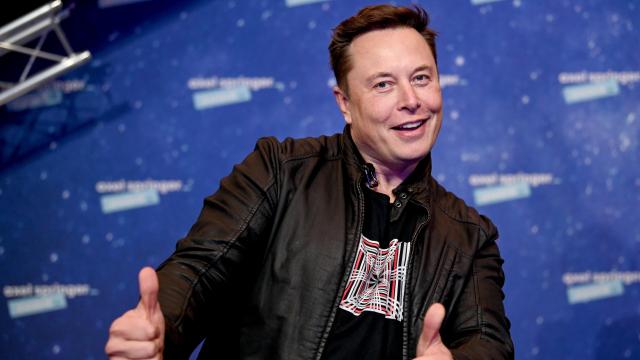Elon Musk’s burgeoning satellite internet service Starlink may have found its newest customer base: disconnected Ukrainians forced offline amidst the fog of war.
Over the weekend, Ukrainian President turned social media phenom Volodymyr Zelensky took to Twitter confirming a new batch of SpaceX’s Starlink terminals were set to arrive in the war-battered country sometime this week. In the Tweet, Zelensky personally thanked Musk and said the new terminals would work towards providing internet access in “destroyed cities.”
Talked to @elonmusk. I’m grateful to him for supporting Ukraine with words and deeds. Next week we will receive another batch of Starlink systems for destroyed cities. Discussed possible space projects 🚀. But I’ll talk about this after the war.
— Володимир Зеленський (@ZelenskyyUa) March 5, 2022
SpaceX started ratcheting up its efforts in Ukraine about two weeks ago, following a public plea from Mykhailo Fedorov, the country’s vice prime minister. In that case, Fedorov took to Twitter less than 48 hours after Russia shocked the world with its full-scale invasion to address the CEO.
“While you try to colonise Mars — Russia try [sic] to occupy Ukraine!” Fedorov said when addressing Musk. “While your rockets successfully land from space — Russian rockets attack Ukrainian civil people!”
@elonmusk, while you try to colonize Mars — Russia try to occupy Ukraine! While your rockets successfully land from space — Russian rockets attack Ukrainian civil people! We ask you to provide Ukraine with Starlink stations and to address sane Russians to stand.
— Mykhailo Fedorov (@FedorovMykhailo) February 26, 2022
Musk promptly responded, saying SpaceX would add more terminals. So far, it seems like he’s delivered.
Ukraine’s internet infrastructure has withstood a battering of cyber attacks and disruptions since the invasion’s onset, somehow remaining remarkably resilient. That resilience is partly thanks to Ukraine’s diverse internet infrastructure featuring “few choke points,” Alp Toker of the monitoring organisation NetBlocks recently told the Guardian. “If an invading nation desired to switch off Ukraine’s internet, this would really be a matter of physically entering internet exchange points and data centres and taking over that infrastructure,” Toker said.
Though most Ukrainians still have some internet access, local broadband providers like Lanet claim they’ve reportedly been forced to hold off on repairs to some damaged infrastructure due to “active military action.”
Meanwhile, Ukrainian officials, last week turned to the public to launch a digital counterattack, with Fedorov calling on volunteer hackers to conduct cyberattacks against Russian businesses, banks, and government entities. More recently, the Ukrainian government urged the Internet Corporation for Assigned Names and Numbers to essentially sever Russia off from the global internet, an extreme move ICANN rejected.
Starlink’s sudden wartime internet infrastructure efforts have already faced challenges. Over the weekend, Musk claimed, without providing specific evidence, that some Starlink terminals near conflict areas were being jammed, “for several hours at a time.” Musk went on to say the company was responding by reprioritizing cyber defence, a swift pivot he claimed could result in delays of the company’s rocket programs. SpaceX did not immediately respond to Gizmodo’s request for comment.
Though it’s still unclear the extent to which the Russian government may have interfered with Starlink services, similar disruptions were reported last week by competing satellite internet firm Viasat. In that case, Viasat said it experienced a partial network outage in Ukraine and other European countries on the first day of Russia’s invasion. According to NetBlocks, Viasat’s Ukraine networks were still experiencing severe outages 11 days after the initial disruption.
And while Musk has shown a willingness to aid Ukraine, he’s simultaneously said he won’t follow the lead of other U.S. companies and block access to questionable Russian news sources spreading potentially harmful information.
“Starlink has been told by some governments (not Ukraine) to block Russian news sources,” Musk Tweeted. “We will not do so unless at gunpoint.”
Starlink has been told by some governments (not Ukraine) to block Russian news sources. We will not do so unless at gunpoint.
Sorry to be a free speech absolutist.
— Elon Musk (@elonmusk) March 5, 2022
Publicly intervening in disaster situations has become something of a trend for Musk. Earlier this year the billionaire sent Starlink terminals to the small Pacific Island nation of Tonga following a massive volcanic eruption that knocked most of its inhabitants offline. Though Musk personally made a splashy show of that whole exchange, the actual utility of that effort was less clear.
Starlink wasn’t able to actually launch its free Tongan internet service until late February, right around the same time Tonga’s severed fibre cables received repairs and came back online. That means Starlink’s actual effect was limited, though recent reports suggest it may play an important role in bolstering connectivity through some of the island’s most remote villages.
“It is rather paradoxical for a devastating volcanic eruption and tsunami to bring to our shores the latest in satellite and communications technology,” Tonga’s Prime Minister Siaosi Sovalen said according to Reuters. “Elon Musk probably didn’t know much about Tonga until January 15, but gave generously.”
